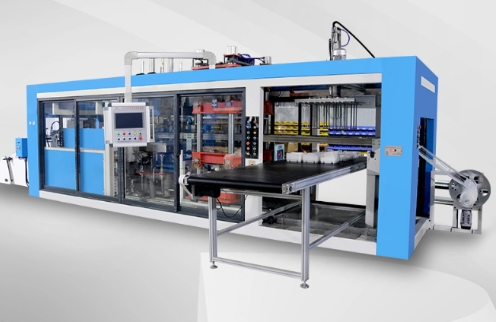Views: 0 Author: Site Editor Publish Time: 2025-10-01 Origin: Site
Are you struggling with slow production? Pressure Thermoforming Machines boost speed and quality. They cut waste and improve precision. In this article, you will learn key benefits. Discover why they excel in large-scale manufacturing.
Pressure thermoforming machines apply high-pressure air and vacuum to mold plastics. This ensures smooth, uniform surfaces that rival injection molding quality. Products like dashboards, consumer device covers, and medical enclosures benefit from precise textures.Smooth finishes reduce post-processing and enhance product appeal.
They reproduce intricate features, undercuts, and embossed logos. This enables more complex designs without sacrificing production speed. Specify detailed molds when ordering a pressure thermoforming machine for sharp, consistent results.
Pressure forming maintains tight dimensional control. It ensures parts meet specifications across hundreds or thousands of units.
Sharper corners and smaller radii create professional aesthetics. These features improve assembly fit and visual appeal. For branded or visible components, edge sharpness enhances customer perception.
High-pressure air accelerates plastic forming. Combined with rapid heating, it reduces production time.
Aluminum or composite molds are easier to prepare than injection molds. This cuts initial labor and cost.
They handle oversized sheets efficiently. Large panels, machine housings, and automotive trims are easily produced. Evaluate machine size against maximum sheet dimensions to optimize output.

Pressure thermoforming molds are less expensive to manufacture. They allow high-quality output without the high upfront cost of injection molds.
| Feature | Pressure Forming | Injection Molding |
|---|---|---|
| Mold Cost | Low to Medium | High |
| Production Volume | Small to Medium | High |
| Surface Detail | High | Very High |
| Lead Time | Short | Long |
The process uses only the required sheet material. Scraps are minimized, lowering production costs.
It enables quick turnarounds for limited-volume projects. Companies can test designs before committing to large-scale production.Consider pressure forming for short-to-medium batch runs to maximize ROI.
Machines work with ABS, PVC, PETG, HDPE, and polycarbonate. Each material suits specific requirements such as impact resistance or transparency.
Polycarbonate: Strong, UV-resistant, clear
ABS: Tough, heat-resistant, colorable
PVC: Rigid, chemical-resistant, flame-retardant
HDPE: Durable, weather-resistant, low-cost
PETG: Transparent, chemical-resistant, flexible
Pressure forming supports embossing, braille, and surface patterns. This adds functional or aesthetic value to parts.Match plastic type to end-use environment for durability and compliance.
Dashboards, door panels, and interior trims benefit from precise dimensions and detailed finishes.
Interior panels, housings, and covers balance strength and lightness. Complex contours are achievable without high-volume molds.
Custom trays, device enclosures, and protective cases gain visual appeal and structural integrity.
Sterile packaging and device housings require compliance with safety standards. Pressure forming ensures uniform, precise production. Highlight machine capabilities when presenting prototypes to regulatory teams.
Modern machines offer automated heating and pressure control. Operators monitor rather than manually adjust processes.
Integrated safety features reduce risk. Less manual handling improves operator efficiency.
They fit standard workflows for assembly and finishing. Automation can further reduce cycle times.Plan layout to minimize material handling and downtime.
Sheets typically range from 0.060 to 0.375 inches. Designs must fit within this scope.
For very large production runs, injection molding may remain more cost-effective.
Higher upfront costs for precision molds can be offset by efficiency and reduced waste over time. Balance machine cost against projected production volume and quality requirements.
Pressure Thermoforming Machine deliver detailed, high-quality parts efficiently. They improve precision, surface finish, and flexibility in large-scale production. MINGDU's machines provide reliable performance and cost savings, helping manufacturers maximize ROI and streamline operations. sment focusing on experience, precision, and support to fully leverage machine benefits.
A: It is a machine that shapes plastic sheets using vacuum and pressure, offering high-quality parts with fine details.
A: Benefits include faster cycles, precise details, cost efficiency, and consistent surface finishes.
A: It improves efficiency, reduces waste, and ensures uniform quality across medium-to-large production runs.